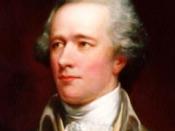1. Articles of confederation
In Philadelphia, 1787 the articles of confederation where revised by 55 delegates. They agree that they needed to write a new constitution, that they where in need of a strong government, that there should be an executive branch (president), and that the states should not be as powerful as a national government. But they also had some disagreements like how many representatives should each state have in congress, how should the slave population count, and how to elect the president and for how long. The compromises they made where "The Great Compromise" that was to create a congress compose of 2 houses: The house of representatives, that was based in population, and the senate, that was equal; "The 3/5 compromises", every 5 slaves was to be counted as 3 free persons; "The Bill of Rights", protects the rights of the people; and that the president is to be elected for 4 years and is elected by the electoral college.
2. Federalist
The leader of the federalist was Alexander Hamilton, they where lead by very popular people like George Washington, Benjamin Franklin, Alexander Hamilton and John J. They where in favor of the constitution because they wanted a strong government, they where very wealthy and where supported by the north east. They won the debate over ratification.
3. Anti-Federalist
The leader of the anti-federalist was Thomas Jefferson. They where in favor of the articles of confederation, they where also against the constitution because they where afraid that a strong nation government was going to take away the rights of the people and the state. They supported workers and farmers and where strongly supported in the south and the west.
4. 3 ways the congress limit's the power of the president
The legislative branch can limit the power...



Hmm
I could have went to dictionary.com and got that information. when I come to this site it is to get information that will help me excell in what I am writing. This just not do it for me.
1 out of 1 people found this comment useful.